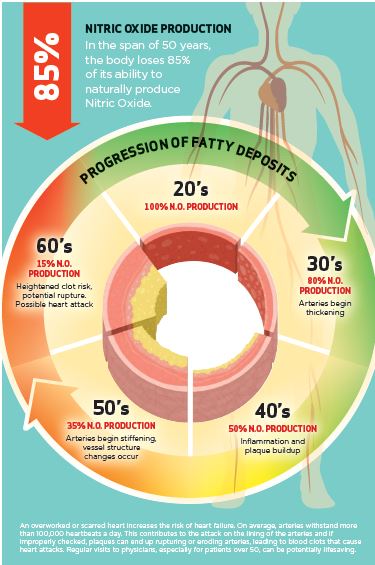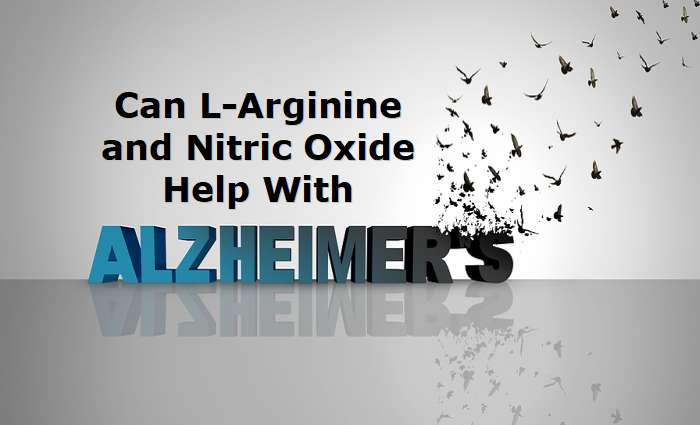In today’s article I want to examine L-arginine, nitric oxide and Alzheimer’s Disease. Currently, there are approximately 6 million people in the United States with this disease.
This age-related neurodegenerative disease is characterized by memory impairment and cognitive issues that become more severe as time passes. Which causes increasing stress and health related challenges for both the patient and their family members.
And while there is currently no effective strategy to treat and prevent Alzheimer’s Disease, every study that I know of that improves blood flow to the brain improves cognitive function.
Maybe a better understanding of L-arginine and nitric oxide can help provide a way to lessen the impact of this disease.
(If you would prefer to view this information in a video format, then please click on my YouTube video below:)
L-arginine in a semi-essential amino acid. What this means is that your body can create this amino acid but not in sufficient quantities to fuel all the metabolic pathways that it’s needed for.
Because of this you need to consume additional food sources or nutritional supplements for this critically important amino acid.
L-arginine fuels 7 different metabolic pathways, but the two most critical ones are:
-
The creation of nitric oxide via the eNOS, iNOS and nNOS enzymes.
-
And ridding of your body of urea via the arginase enzymes.
Which brings us back to Alzheimer’s Disease. The exact cause of this disease is not completely known but studies suggest the following have an impact:
-
Atherosclerosis,
-
Redox Stress,
-
Inflammatory Processes,
-
Abnormal Neurotransmission,
-
and Brain Glucose Metabolism.
When you examine each of these items, you will discover that l-arginine and nitric oxide play an important role in either preventing a negative item like atherosclerosis. Or improving a needed item like brain glucose metabolism.
So I began a Google search for “L-arginine and Brain Disorders” and found the following articles:
L-Arginine and Alzheimer’s Disease
The role of nitric oxide in brain disorders: Autism spectrum disorder and other psychiatric, neurological, and neurodegenerative disorders
Nitric Oxide And Mental Health
You can click on the title for each article to link to their information.
For this video I want to focus on helping you understand the information contained in the PubMed article “L-Arginine and Alzheimer’s Disease.”
Let’s start with atherosclerosis. There is strong evidence that atherosclerosis plays a major role in the start and progression of Alzheimer’s Disease.

According to this graphic, as we age two major factors occur in your vascular system:
First, there is inflammation that lead to plaque formation. Two primary factors for this are high blood pressure and oxidized LDL or bad cholesterol. This cumulative damage is called atherosclerosis. As we age this level of damage increases in your vascular system.
Second, as the lining of your vascular system, what is called the endothelium, is damaged there is a decrease in the production of nitric oxide. By the time you are in your sixties your level of nitric oxide has been dramatically reduce by as much as 85%.
Alzheimer’s Disease doesn’t just show up over night. Rather, it shows up as you age and one of the contributing factors is the process called atherosclerosis.
L-arginine is converted to nitric oxide by the eNOS enzymes of the endothelium. This process improves blood flow and helps to initiate repair of the endothelium. By properly supplying your endothelium with the needed nutrients to optimize nitric oxide production you can both increase your nitric oxide levels. As well as improve the health of the endothelium.
The next issue is redox stress. Since your brain needs a large amount of oxygen to function properly, the potential for free radical damage is always present. The literature in this area of all across the board.
Some studies indicate that L-arginine and nitric oxide can increase this redox stress by forming higher concentrations of free radicals.
Other studies indicate just the opposite. Instead, l-arginine, and its conversion to nitric oxide, helps to prevent oxidative stress.
One area that most of the literature agrees on is how l-arginine and nitric oxide help improve the immune system response. This in turn helps to lessen inflammatory processes, especially in the brain.
Most diseases start with some form of inflammation. This means that anything you can do to reduce inflammation in the body usually has a protective effect.
The proper use of l-arginine and nitric oxide in your body help to reduce inflammation.
Regarding neurotransmission, nitric oxide is a key component in proper brain function. This molecule is used to regulate the synaptic plasticity involved the following:
-
Cognitive Processes,
-
Memory,
-
and Strengthening Nerve Impulses to Increase Signal Transmission Between Neurons.
Proper functioning of the eNOS and nNOS enzymes help to regulate this nitric oxide signaling component in your brain. And most of the research shows that when this is properly regulated, then cognitive function improves.
Finally, we have glucose metabolism. Your brain’s ability to properly metabolize glucose is a key factor in memory. Alzheimer’s disease patients show significant abnormalities in glucose metabolism.
Studies have shown that improved glucose intake temporarily improves memory function in Alzheimer’s disease patients. However, it requires longer than normal for this to occur.
This element of glucose metabolism is key to verbal and visual memory and learning patterns.
And this is where L-arginine and nitric oxide can have a tremendous impact on brain function.
First, nitric oxide helps to normalize glucose metabolism by increasing glucose transport.
Second, nitric oxide facilitated the uptake of glucose into cells.
Third, L-arginine regulates insulin release, which is need for proper glucose metabolism.
Fourth, both l-arginine and nitric oxide work together to enhance insulin sensitivity for improved glucose metabolism.
All four of these factors have a positive benefit for those with Alzheimer’s disease.
Now one final element that is involved in cognitive decline associated with Alzheimer’s disease is a continuing decrease in neurons. Most drug treatment programs center on trying to stop the loss of neurons.
However, an alternative approach is neurogenesis, which is the formation of new neurons usually from stem cells in the nervous system.
L-arginine enhances this formulation through the arginase pathway. While this is a complex process, it first starts with the enzyme arginase and how it converts l-arginine into compounds that can then be used to stimulate the growth of new neurons.
Additionally, there is growing evidence on how nitric oxide plays a critical role in regulating neurogenesis as well as neural survival.
While there is still much to be learned, when you add up the existing information it’s clear that l-arginine and nitric oxide are important to proper cognitive function. And when properly harnessed can help improve cognitive function even in diseases like Alzheimer’s.
Blessing Lives Through Nitric Oxide Therapy!
Dan Hammer

Leave a Reply
You must be logged in to post a comment.